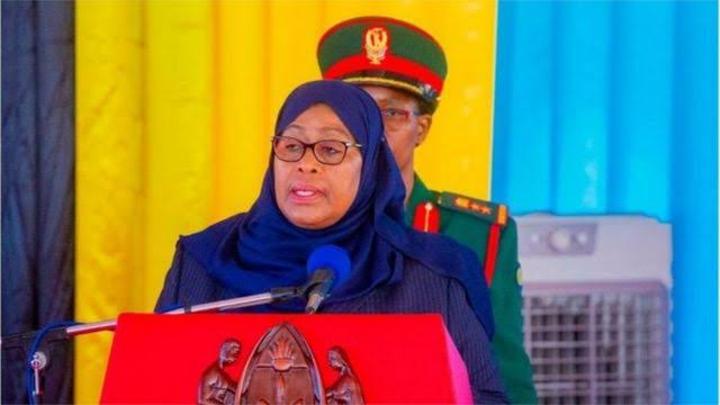Africa-Press – Tanzania. PRESIDENT Samia Suluhu Hassan yesterday pledged a review of mobile money transaction charges but insisted that the newly-introduced levy is crucial in generating revenue for rural Also, the amendments have imposed a levy of between 10/- to 200/- per day per SIM card depending on the ability of the user to recharge the balance whereby the government intends to collect 396.3bn/-.
The charges have attracted concerns and views from the public, claiming that the deductions were too high. President Samia said since the government was attentive, it had heard people’s complaints and worked on the matter.
“I directed two ministers (Finance and Planning Minister and Minister for Communications and Information Technology) to sit down and work on the matter,” President Samia said.
She said upon receiving recommendations from the committee the government will inform the public on the way forward. President Samia stressed that the government introduced the levies with the good intention of BoT pumps 1tri/- to boost private sector development.
President Samia hinted that the mobile money levy will come with a relief as the government is set to receive recommendations from a committee formed to work on the public concern against new mobile transactions charges.
The government recently formed the committee to collect opinions from stakeholders to review charges on mobile transactions following the public outcry since the new levies were introduced this month.
“I want to tell Tanzanians that we’ll maintain the levies but we will come up with a better way to implement them without hurting citizens, so that we can push the development forward,” President Samia stated when swearing in newly-appointed ambassadors at the State House yesterday.
During the previous budget meeting, the parliament endorsed amendments to the Electronic and Postal Communication Act, CAP 306, 2008 for imposition of a levy of between 10/- to 10,000/- in each mobile money transaction of sending and withdrawing whereby the government targets to collect 1.2 tril/.
Also, the amendments have imposed a levy of between 10/- to 200/- per day per SIM card depending on the ability of the user to recharge the balance whereby the government intends to collect 396.3bn/-.
The charges have attracted concerns and views from the public, claiming that the deductions were too high. President Samia said since the government was attentive, it had heard people’s complaints and worked on the matter.
“I directed two ministers (Finance and Planning Minister and Minister for Communications and Information Technology) to sit down and work on the matter,” President Samia said.
She said upon receiving recommendations from the committee the government will inform the public on the way forward. President Samia stressed that the government introduced the levies with the good intention of improving roads and water availability, especially in rural areas.
“Our farmers countrywide have largely been motivated to engage in commercial farming, but once they harvest, they cannot transport their produce to the market due to poor roads in rural areas,” noted the president.
She said, hence, a large part of the money to be raised from mobile levy would go to improve road and water infrastructure in rural areas.
“Everyone is aware of the problem of water availability in rural areas. We have so far reached 74 per cent coverage …we still have 26 percent remaining, we intend to raise the money to improve water services in rural settings.” Meanwhile, President Samia has said the government is making efforts to ensure there is an adequate supply of fertilizers in the country at affordable prices.
President Samia said the current shortage of fertilisers was caused by Covid-19 pandemic which paralysed agricultural activities globally, forcing most industries into halting production.
Explaining the reason for the price hike, President Samia said during the first wave of Covid-19 fertilizer industries in Europe stopped production, thus creating low supply and high demand, which resulted in high prices.
She said the resumption of agricultural production in the world was compounded with the scarcity of fertilizers as some of the industries are yet to resume operations.
“We are aware of it and we will ensure that fertilizers are available in the country and sold to farmers at affordable prices,” she affirmed.
She said efforts are ongoing to fast-track the completion of a fertilizer factory in Dodoma so that it starts production next year. Recently, the government abolished the tender process for fertilizer importation in the country, thus opening doors for any trader, who intends to bring fertilizer into the country to have the opportunity.
The Minister for Agriculture Prof Adolf Mkenda explained that the purpose of abolishing the tender procedure was meant to increase competition among the business people, who import bulk fertiliser and thus impact the commodity price.
Prof Mkenda added that if there will be an increase in fertiliser importation in the country, there are possibilities for the fall in prices, which will significantly benefit the farmers.
Minister Mkenda also encouraged investors to build fertiliser factories to increase production in the country. He said establishment of more factories will reduce the country’s dependency on imported fertilisers.







